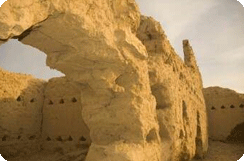 Muhammad bin Abd al-Wahhaab was born in 1115H (1703CE) in al-Uyainah, in the region of al-Yamaamah in the middle of the Arabian peninsula. He was born into a family dedicated to knowledge. His father, Abd al-Wahhab bin Sulayman, was from the well-known scholars, and judges of the Najd region. His grandfather, Sulayman bin Ali was a scholar in jurisprudence and was the muftee of the land in his time. And his uncle Shaykh Ibrahim bin Sulayman was also from the best of scholars. Ibn Abd al-Wahhaab was born into this environment of knowledge. He memorized the Qur'an by the age of ten, and studied Hanbali fiqh with his father. He also read the books of tafseer, usool, and likewise he came across the books of Ibn Taymiyyah and Ibn al-Qayyim. He travelled to Basrah, al-Ahsaa, Makkah and Madeenah, meeting with the scholars, and studying with them, and he acquired knowledge of hadeeth, fiqh and tafseer.
Muhammad bin Abd al-Wahhaab was born in 1115H (1703CE) in al-Uyainah, in the region of al-Yamaamah in the middle of the Arabian peninsula. He was born into a family dedicated to knowledge. His father, Abd al-Wahhab bin Sulayman, was from the well-known scholars, and judges of the Najd region. His grandfather, Sulayman bin Ali was a scholar in jurisprudence and was the muftee of the land in his time. And his uncle Shaykh Ibrahim bin Sulayman was also from the best of scholars. Ibn Abd al-Wahhaab was born into this environment of knowledge. He memorized the Qur'an by the age of ten, and studied Hanbali fiqh with his father. He also read the books of tafseer, usool, and likewise he came across the books of Ibn Taymiyyah and Ibn al-Qayyim. He travelled to Basrah, al-Ahsaa, Makkah and Madeenah, meeting with the scholars, and studying with them, and he acquired knowledge of hadeeth, fiqh and tafseer.
The condition of the Muslims in his time was a dire one and is described by historians and by both Imaam al-Shawkani (d. 1834CE) and Imaam al-San'aanee (d. 1769CE) (both contemporaries) as one in which the people had turned to worshipping graves, stones, trees and the likes. The people had abandoned or were very lax towards the main symbols of worship (prayer, zakah) and were content with innovations which became their connection to the religion, and rare were the scholars who would enjoin the good and forbid the evil, most were content with the status quo, and those who were not content were not able to speak out due to not having the will and courage.
In this setting, Ibn Abd al-Wahhab began calling the people to the monotheism of the Prophets and Messengers, and rejected the worship of the graves, attachment to them, and soliciting intercession from them, and calling upon the dead for rescue from calamity and what is similar to this. This was not a new call and nor an innovated call for he was preceded in this rejection by centuries by other scholars such as Ibn Aqeel (d. 488H) and Ibn al-Jawzee (d. 597H), both Hanbalis, and the erroneous nature of these practices was even indicated by Fakhr al-Din al-Razi (d. 606H) - see this article and likewise al-Maqrizi (d. 845H), the Shafi'i scholar from Egypt (see this article). His call started in Huraymalah, then went to al-Uyainah where he won temporary support of Uthmaan bin Mu'ammar, and then al-Dir'iyyah where he won the support of the leader, Muhammad bin Sa'ud, who had accepted his call.
The Ottomans had previously taken over the Hijaz (western province, Makkah, Madinah) and Yemen. However, their control never extended to Najd, the region where the call of Ibn Abd al-Wahhaab was in momentum, and whatever hold they had on the region had gradually waned. Najd itself was an autonomous region having many local leaders.
Ibn Abd al-Wahhaab faced opposition, enmity and agression at both the initiation of his call and its progression. However, it spread successfully across the peninsula. Many lies and slanders were spread about him and his call, and these have continued to this day, from them:
- That he rejects the four schools
- That he claims independent ijtihaad for himself
- That he forbids visiting the grave of the Prophet (sallallaahu alayhi wasallam)
- That he prohibits sending salaah upon the Prophet (sallallaahu alayhi wasallam)
- That he declares as disbelievers all Muslims except those who follow him
- That he rejects intercession
- That he fights and kills the Muslims
Despite the fact that all the writings of Ibn Abd al-Wahhaab and his teachings are well-documented, spread and known, Ibn Abd al-Wahhaab and those who are labelled as 'Wahhabis' are the subject of much speech and propaganda. Much of this comes from the Sufis who have historical enmity. Similarly from those (both Muslims and non-Muslims) who associate the da'wah of Ibn Abd al-Wahhab with today's extremists and terrorists who draw upon the writings of Ibn Abd al-Wahhaab to support their methodologies of takfir and khurooj (revolt). The great deal of sensitivity involved therefore makes the perception of the life and teachings of this scholar rather misty and filled with sectarian and political agendas. At a state level, there are nations which for historical and political reasons have a strong interest to push anti-'Wahhabi' propaganda, from them Sufis of Turkey (former Ottoman state), the Raafidi Shi'ah of Iran and the Nusayri Batinis of Syria. As Sufism and Shi'ism have historical connections, most of the propaganda comes from these directions.
 A Brief History
A Brief History

 A Brief History
A Brief History
